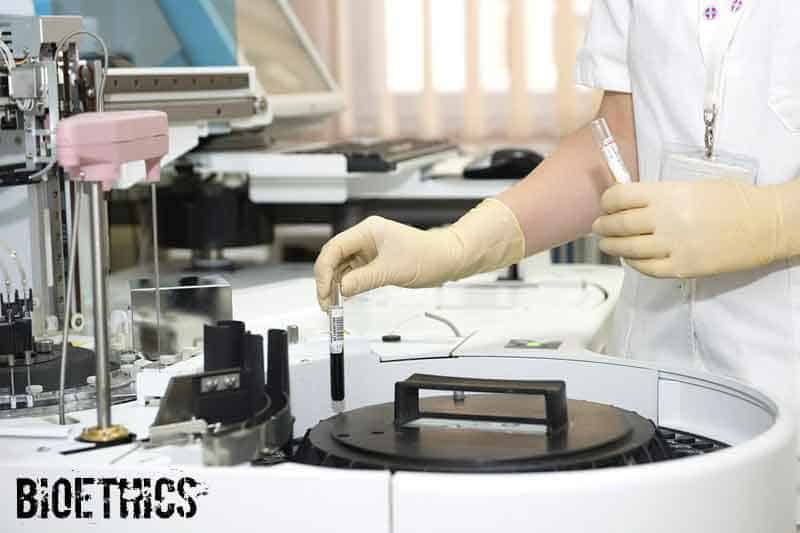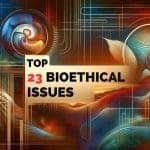
Bioethics can rightly be described as a combination of two subjects – Biology and Philosophy. Wondering why philosophy? Well, ethics is a typical discipline of philosophical studies. Philosophy shows the ropes of a perfectly moral life in society for any human being and ethics stick to the notion of right and wrong, good and bad. In the field of medicine and healthcare, professionals come up with complex issues and disputed points.
Top 23 Bioethical Issues In Biological Advancements
Why is the one responsible for another and for what reason? Is the effort worthwhile? What are the right things and how to put them to use? What are the obligations people share with one another? How to decide the best possible solutions to a problem without meddling with good moral traits?
This is where bioethics comes into play. Bioethicists skillfully apply theories of ethics to the field of advanced medicine and healthcare. They draw up answers, based on religious theories, secular traditions, innovative scientific advancements and moral philosophies. Bioethicists also take into consideration the advancement and benefits of an upgraded medical technology towards the better maintenance of health and treatment of harmful ailing conditions. In a nutshell, bioethics is a study of multiple subjects like philosophy, theology, nursing, history, medicinal laws, healthcare policies and studies of humanities in the field of medicine.
“Common man’s understanding on what is ethical has seen tremendous growth” – do you agree?
Studies show that we are all well grounded about the ethical do’s and don’ts. Even doctors make it a point to describe the proposed form of treatment to their patients. These patients have the right to inquire about it and refuse the same if considered unnecessary. The remarkable impacts of bioethics are endless.
First termed by Professor Van Rensselear Potter in the year 1971, ‘BIOETHICS’ has remarkably developed from being just a subject of study to a multidisciplinary area of study and activity. It is not restricted within the walls of a laboratory. Instead, the subject of bioethics is discussed in open. From offices to academies, classrooms to hospitals wards and labs, the application of ethical standards on medicinal practices are deliberated, reviewed, challenged and also revised anywhere. Therefore, bioethics is not a subject of study for doctors and scientists only. Ordinary people like you and me, politicians and any common person can participate and learn about the scopes of Bioethics.
Here are some excellent bioethics related web resources:
Bioethics Resources on the Web – National Institutes of Health
This website contains a broad collage of annotated web links, and while this list is comprehensive, it is not totally inclusive. The listed resources provide background information and various positions on issues in bioethics.
Informational site related to the services of Bioethics, Inc. Newsletter, hottopics and linksrelated to contemporary bioethical issues.
Bioethics.Net: where the world finds bioethics
The most comprehensive resource for bioethics on the internet.
Center for Bioethics and Health Law, University of Pittsburgh
Founded in 1987 as the Center for Medical Ethics, and given an expanded mission and renamed in 1998, the University of Pittsburgh Center for Bioethics and Health Law in Pittsburgh, PA, is committed to bringing together scholars and researchers from a variety of disciplines to cooperate in addressing issues in bioethics and law from both theoretical and clinical perspectives.
Center for the Study of Bioethics
Center for the Study of Bioethics, Medical College of Wisconsin.
We invite you to experience the unfiltered story of American eugenics . primarily through materials from the Eugenics Record Office at Cold Spring Harbor, which was the center of American eugenics research from 1910-1940. In the Archive, you will see numerous reports, articles, charts, and pedigrees that were considered scientific “facts” in their day. It is important to remind yourself that the vast majority of eugenics work has been completely discredited.
Introduction to Bioethics, a 5 credit fully online course taught by Dr. Tom Kerns
The bioethics of clinical medical practice, medical research, health care ethics, public health, and human rights are dealt with in this course.
Midwest Bioethics Center is a community-based ethics center, founded in 1984 by a physician, an attorney, and a philosopher. Dedicated to its mission to integrate ethical considerations into healthcare decision-making throughout communities, the Center offers workshops and educational programs for professionals.
St James Ethics Center is an independent, not-for-profit organisation which provides a forum for promoting ethics generally and encourages individuals and organisations to include the ethical dimension in their daily decision making.
Tuskegee University National Center for Bioethics in Research & Health Care
This is the nation’s first bioethics center devoted to engaging the sciences, humanities, law and religious faiths in the exploration of the core moral issues which underlie research and medical treatment of African Americans and other un-derserved people.
This site is an excellent resource for current and future members of the CBS, as well as for any other entities interested in bioethical related issues. It was established in 1988 from the fusion of the Canadian Society of Bioethics and the Société Canadienne de la bioéthique médicale. Currently, the Canadian Bioethics Society has over 600 current members.
The Center for Bioethics and Human Dignity
This site helps individuals and organizations address the demanding bioethical challenges of our present lives, including managed care, end-of-life treatment, genetic intervention, euthanasia and suicide, and reproductive technologies.
This organization enables members of the health care community to identify and resolve ethical issues which arise in the clinical setting. They do this through education, case consultations, policy development, and research.
American Society of Bioethics and Humanities
This ASBH report is intended for ethics consultants; educational programs that help prepare individuals, teams, or committees to do ethics consultations; and all health care organizations that offer ethics consultation services.












